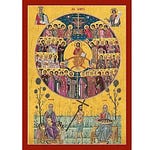I want to continue the Lenten reflection about concupiscence, what the Prayer Book calls “wretchedness.” Before getting into that, I find it such a poignant question that Saint Paul asks, in his Epistle to the Romans. He asks, “Who shall separate us from the love of Christ?” When we think of the trajectory of Paul’s life, the poignancy of his question particularly stands out. The greatest persecutor of Christ, turned to His greatest public advocate. It is the love of Christ which is responsible for this dramatic shift: specifically, Christ’s love of Paul. Because Jesus Christ loved Paul, Paul came to love Jesus. By the grace of Our Lord Jesus Christ, Paul then learned how to cooperate with grace and through the grace of Christ be transformed.
It was rooted in the love Christ had for Paul through Paul’s study of the Scriptures (and despite his misinterpretation of them until Paul’s conversion); it was rooted in the love Christ had for Paul as he was consenting to the stoning of S. Stephen the holy deacon and martyr, for it was Christ’s love for Paul that allowed Paul to see in Stephen’s face the face of an angel, it was Christ’s love for Paul which allowed Paul to hear Stephen’s confession (the testimony in which Stephen showed Jesus revealed in the Old Testament); it was Christ’s love for Paul which allowed him to perceive Stephen being full of the Holy Ghost, and in looking up steadfastly into heaven, that Stephen saw the glory of God, and Jesus standing on the right hand of God; and it was Christ’s love for Paul that allowed him to hear Stephen say “Behold, I see the heavens opened, and the Son of man standing on the right hand of God.” It was because of the quiet and enduring love Jesus had for Paul that waited through the years of rejecting Christ’s call upon him until the time was right for Paul to receive the Gospel, that the seed of Stephen’s blood was planted in the soil of Paul’s heart. Thus Paul, after he embraced Jesus, could never imagine being separated from the love Christ showed him.
In a very real sense, it is impossible for a serious Christian to imagine not being baptized. This is what Paul means when he writes to us saying that nothing can separate us from the love of Christ. Baptism is God’s permanent action upon us—action of the heavenly upon the earthly. In Baptism we are given heavenly citizenship. It is impossible to imagine not being baptized because it is impossible to undo God’s action; it is impossible to return the unspeakable gift to its sender.
But it is possible to not fully receive the gift. For that, consider two scenarios. In the first scenario, someone gives you clothing as a gift that upon opening you realize you might never wear (or wear just once and never again). You certainly can be thankful to the person for the gift as you put that clothing somewhere in the deep reaches of our closet or drawer (that place where clothes go, never to return). This is one way of receiving the gift. Compare this to a second scenario, where a person gives a gift of some other piece of clothing, only this time in opening the gift you realize you will not just try it on but probably wear it regularly, and regularly for some time, even often—in other words, rather than being put into the deepest part of the closet, the clothing enters into the regular rhythm of your attire. Given these two scenarios, which is truly receiving it? It is obviously the second scenario, where the gift is not merely opened but actually used.
It is in this way Paul is teaching us about Baptism. Nothing can separate us from the true gift of Baptism, except our not using the gift. Paul says “nothing”—it is best to understand him as saying, “nothing real.” The gift of baptism, as offered by God, is completely offered by God, in no way earned by its recipient. But then why is it so often the case that Christians do not wear their baptism? Why is it Christians treat baptism in that first scenario, receiving the gift but putting it into the far corner of their closet, never (or at best rarely) to wear? Why, in other words, are so many baptized Christian indistinguishable in how they act from non-baptized persons?
To answer this we continue with our look at concupiscence, our inclination to sin. More specifically, it is the excessive and inordinate desire for personal satisfaction: desiring the things of the world rather than the things of the spirit. It is often seen as craving of the flesh for that which is merely fleshly. Basic examples are eating, drinking, sex, and money. When used, these provide pleasures, but their effects do not stop short with the physical. The desire for these can be disordered, and what happens when desire for food, drink, sex, and money is disordered is that these are craved by the flesh for what is merely fleshly: taste, intoxication, gratification, and profligate and extravagant living. Yet, each of these can be ordered rightly by Christian expression: eating and drinking are means not only for human fellowship, but spiritual fellowship; sex, rightly used in Christian marriage, can lead not only to procreation of children but that complete union of man and woman which perfects the Sacrament of Matrimony; and money can be used to support the Church, to help people through acts of mercy, and to increase beauty and goodness in the world. Our desires rightly ordered lives into and receives the gift of Baptism. Desires disordered by concupiscence act without reference to the higher ends for which man was made.
The remedy for concupiscence, then, is to live baptismally, to put on Christ, to live in Christ, even as Our Lord taught directly; for He said “If any man would come after Me, let him deny himself and take up his cross and follow me.” To wear the gift of Baptism means denial of our fleshly desires, thus bearing our cross, and with our desires reordered we follow Christ with the not with the swagger of the Pharisee but the humility and simplicity of the Publican. Self-denial (also called dying to self) is our cooperation with baptismal grace by which God prunes away the unreal from our lives, our minds, our heart. It is the unreality of sin which separates us from the love of God. But Jesus Christ is He who pierces all illusions to reveal to us the Way, the Life, and the Truth, which is Him who is the Light of the world of darkness and unreality, and Who lives and reigns with the Father and the Holy Ghost, one God, now and ever, and unto the ages of ages. Amen.









